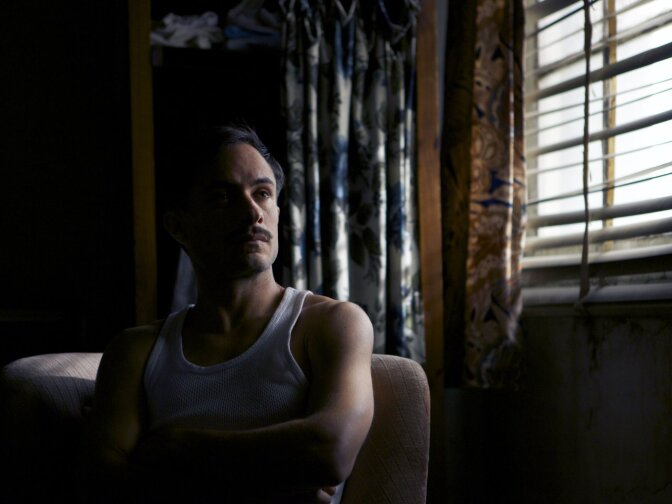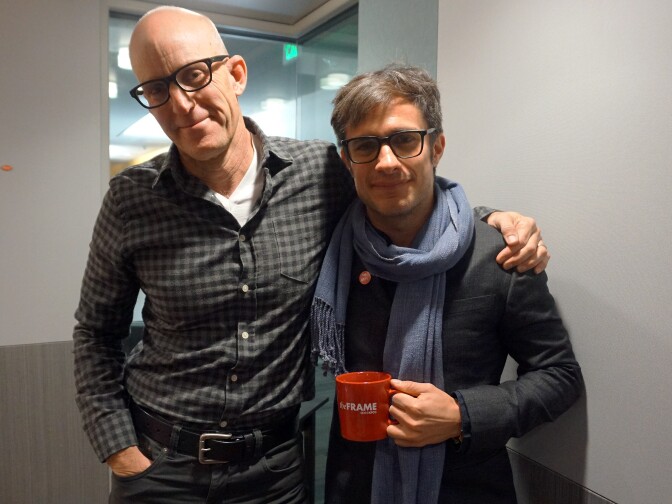Gael García Bernal joins The Frame to discuss his most recent movies "Neruda" and "Desierto" provoking a dynamic conversation about poetry, politics, and migration; Musician Kim Gordon opens up life after Sonic Youth and her new band, Body/Head; With awards season in full swing, we check in with Vulture's Kyle Buchanan, as co-host of The Awards Show Show podcast he us up to date on the state of the race.
Can less credible film awards sway Oscar voters?
Southern California might be in the midst of an epic drought, but when it comes to movie awards, we are getting soaked by a deluge of ceremonies and nominations.
Several ragtag journalist organizations have just either handed out trophies (the Broadcast Film Critics Association) or announced nominees (the Hollywood Foreign Press Association — that’s the dubious outfit behind the Golden Globes).
But the film award selections that actually matter begin with this week’s nominations from the Screen Actors Guild. That said, there are now some discernible frontrunners, and some films that could be fading fast.
For more on this we called up Kyle Buchanan. He’s a senior editor at Vulture.com, and my co-host on The Awards Show Show podcast.
Interview Highlights:
What's on the mind of Oscar voters:
There are a whole lot of messages that Oscar voters could or might care to send this year, not just to the nation in the wake of a Trump election, but to the industry in the wake of two years of #OscarsSoWhite — the controversy over 20 all white acting nominees, which we had both of the last two years. This year is likely to be very different. There are a whole lot of actors of color [who] are almost certainly going to be in the mix. I think that gives [voters] almost a little bit of cover to perhaps go for "La La Land," which isn't necessarily sending any sort of political message and is kind of in line with what a traditional [Motion Picture] Academy vote might look like.
On why "La La Land" could have a winning advantage:
I think you could go either way. Certainly the Academy prefers their films to have a little big of heft and a little bit of weight to them. However, I think "La La Land"'s advantage is not just the tone of it, it's the fact that the finale is incredible. Damien Chazelle directed "La La Land" and who also directed "Whiplash." If you saw "Whiplash" and you remember that bravura 10 minute sequence at the end, "La La Land' offers something that might even top it. That sends you out of the theater on a major high that I think Oscar voters won't forget.
Kim Gordon: 'I never really thought of myself as an icon'
Sonic Youth was a band I didn’t appreciate until college. I was still in grade school when the group broke into the mainstream in the mid '90s. I do, however, remember the first song that got me into the band. It was a cover of “Superstar,” made famous by the pop group, The Carpenters, in 1971.
As Kim Gordon told me:
I'm a lot older than you so I remember when The Carpenters weren't cool then. But [Karen Carpenter] just has such a beautiful voice. It's so soulful and it's interesting how, out of the context of that time, you can just listen to the music. Usually I'm all about how important context is to understand.
And just like Gordon wanting to get into Karen Carpenter’s head, I wanted to know what makes her tick creatively. So I started at the beginning, when Gordon was growing up in Los Angeles.
I remember when I was a teenager, food was a big part in my family and my parents were both good cooks. But one way to rebel was just not to want to eat dinner.
James Kim: Was there a lot of you wanting to rebel?
Yeah, I was pretty rebellious. I just didn't like being told what to do.
Kim: Why is that?
I'm just deeply stubborn. No, I was very independent as a kid. So I just felt like I could do everything.
Before playing the guitar, Gordon picked up a paintbrush and began taking art classes outside of high school. She eventually attended Otis Art Institute and found her way to New York in the ‘70s where she discovered punk rock.
I went to New York to make art and then I saw these bands and I thought that it was just so free and interesting. An artist friend of mine asked me to be a part of this performance piece to perform in an all-girl band. So that was kind of the beginning.
The band was called CKM. It was short-lived. But soon after, Gordon met guitarists Thurston Moore and Lee Ranaldo, and together they formed the noise-rock band Sonic Youth in 1981.
The band had an underground following until its third album, “EVOL,” was released in 1986. The album was a hit with critics, and Robert Christgau, the legendary rock writer who actually panned the band earlier in its career, wrote a review for The Village Voice that said: “The good parts are so good that for a while there I thought I was enjoying the bad parts.”
Sonic Youth’s follow-up album, “Sister,” was also well received. And then, “Daydream Nation” was released in 1988. Rolling Stone, Billboard, the L.A. Times and The Guardian all hailed it as one of the best albums of the year. And in 2005, it was one of 50 albums selected by the Library of Congress to be added to the National Recording Registry.
The band went on to sign with a major label, Geffen Records. And they even had Chuck D from Public Enemy do guest vocals on the song, “Kool Thing,” from the 1990 album, “Goo.”
Sonic Youth headlined major festivals throughout the ‘90s and was even featured on an episode of “The Simpsons” titled "Homerpalooza." After releasing 15 studio albums from 1983 to 2009, the band ended in 2011, as did Gordon's 27-year marriage to Thurston Moore. "I think when Sonic Youth broke up, it was in a sense freeing in a way," she says. "I could go back to just playing music that felt more natural to me."
Gordon went on to start a new band, called Body/Head, with guitarist Bill Nace. The duo released the album “Coming Apart” in 2013, and most recently a live album called “No Waves.”
The music is experimental and the band often improvises on stage. And earlier this year, Gordon released her first solo song, “Murdered Out.”
After spending the day at Kim Gordon’s house, recounting her life from art school to Sonic Youth to the present day, I couldn’t help but wonder if she thinks about the imprint she has made in the music world.
I never really thought of myself as an icon or being looked up to. It just can be paralyzing if you think too much about what [people] think of you. Hopefully I'm a role model to my daughter. But I never want to be glib about anything. I like to almost feel like I'm starting over for the first time.
Gael García Bernal: Poetry, politics, movies and migration
Mexican actor and filmmaker Gael García Bernal recently joined us in The Frame's studio to discuss his latest movie, "Neruda." Bernal plays a detective tasked with arresting Pablo Neruda, the poet who was wanted by the Chilean government for joining the outlawed Communist party.
But the conversation soon veered to the U.S. elections, his previous film, "Desierto," migration, politics and poetry.
But Bernal is not only interested in making narrative film and television. (He stars in Amazon's "Mozart in the Jungle.") He’s a champion of documentary films and, with fellow actor Diego Luna, he founded the traveling documentary film festival known as Ambulante.
When Bernal joined us at The Frame, he started by talking about how he was introduced to Neruda in high school.
Interview Highlights:
On Neruda as an icon:
Neruda definitely is like a pillar of the 20th Century. He was a man of his time as well. Like many intellectuals and illustrated people in those days, they were participants in the political movements that were going on after the second World War. He was a Communist senator. He just had a really prolific career.

On telling stories about the border and being a migrant.
If you're talking about people being able to become something for themselves: the character in "Desierto," Moises, already has a life in the United States and he's coming back home in a way — a life that he invented for himself. Pablo Neruda is escaping Chile with sadness, but also with the joy of becoming someone — becoming the multitude of someone that he can be. The power of crossing a line in a sense, at least on that administrative space of mind — to change things, to change yourself. I've gotta say, I've been a migrant a lot. I've been traveling a lot, living in different countries and changing things. Right now I live in Mexico, and I still feel like being "the other" is an interesting way of seeing things.
His reflections as an artist on migrant culture:
We don't see the reality, which is that we are so interdependent between Mexico and the United States. We're neighbors. We've established ourselves to live along this area and culturally we are so ... let alone interdependent, so mixed in a way that it's important to just accept it for once and for all and to not talk about it in Cold War terms as if Fidel [Castro] was alive! Let's stop that. Let's just stop talking about it as if there was this huge divide that exists between people. Obviously, if we talk about that horrendous concept of a wall, undoubtedly it is the least practical thing that can ever exist nowadays, for many reasons.

On showing stories that connect rather than divide:
With "Neruda," we're not doing his [biography]. We're doing something about his work. His work is his life. What one leaves in the world is your work and, in this sense, Neruda described the country, built mountains, built forests. Whenever you are in the south of Chile, you think you are inside a Neruda poem. Neruda lived a multiplicity of lives within one life, defended ambiguity, had very strong convictions politically. He's a person [who] inspires that, so let's do stories of them and of "simplicity" as well. It is a moment to not feel despair, but to feel empowered because we can really change things. I know it might sound slightly naive — we want the immediate result whenever there's a film: What is the quantifiable social change that this film [made]? Well, it's never going to be quantifiable. It's in the long run, in a way. But those are the stronger victories. Those are the things that actually change everything.





